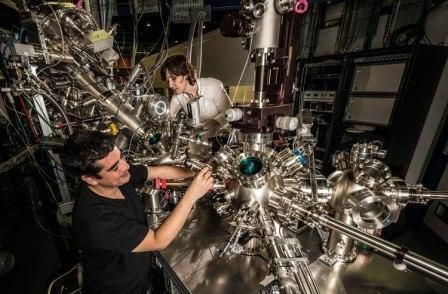
05/11/2014
New catalysts investigated with the ALBA Synchrotron
New catalysts investigated with the ALBA Synchrotron
A group of researchers, led by UPC university in Barcelona, which works on catalysts, has discovered that atoms react differently depending on the characteristics of the support that is used. Part of this study, which has been published on October 31 in the famous Science Magazine, was performed at the CIRCE beamline of ALBA Synchrotron.
The study is an important step forward in the design of new catalysts with applications in the field of energy: the catalyst investigated by the researchers contains metal (rhodium and palladium) nanoparticles and is very effective at producing hydrogen, a product that could replace fossil fuels and contribute to the energy transition.
News based on the press release issued by ALBA Synchrotron.
Image: ALBA Synchroton - Researchers Virginia Pérez-Dieste and Carlos Escudero at NAPP endstation of CIRCE beamline of ALBA Synchrotron
The study is an important step forward in the design of new catalysts with applications in the field of energy: the catalyst investigated by the researchers contains metal (rhodium and palladium) nanoparticles and is very effective at producing hydrogen, a product that could replace fossil fuels and contribute to the energy transition.
News based on the press release issued by ALBA Synchrotron.
Image: ALBA Synchroton - Researchers Virginia Pérez-Dieste and Carlos Escudero at NAPP endstation of CIRCE beamline of ALBA Synchrotron
More news
27/06/2017
Barcelona Synchrotron Park’s sustainable brownfield restoration program presented at AquaConSoil 2017
21/06/2017
Catalonia confirms itself as pole of attraction for foreign investments
15/06/2017
Construction of the Natura Bissé’s new world headquarters is well on its way
06/06/2017
Walk in the Park: the biodiversity routes await you
31/05/2017
UAB second most innovative university in Spain
24/05/2017
PRUAB: 10 years in strengthening relationships between research and business fabric









